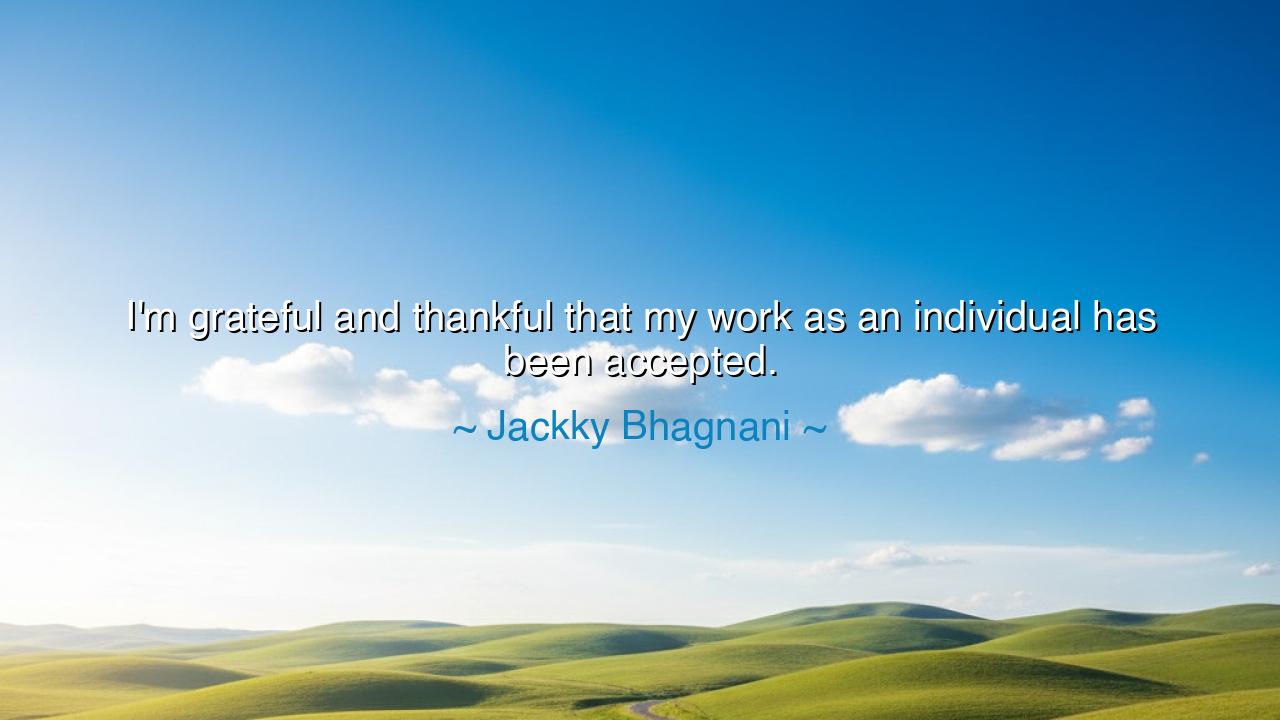
I'm grateful and thankful that my work as an individual has been






Hear the words of Jackky Bhagnani, spoken with humility and relief: “I’m grateful and thankful that my work as an individual has been accepted.” This declaration shines like a lamp upon the ancient struggle of all who labor to create: the yearning not merely to produce, but to be seen, to be recognized, to have one’s efforts acknowledged by the world. For work without acceptance often feels like a seed cast upon barren soil, but work embraced by others blossoms into fruit, sustaining not only the one who toiled but all who partake of it.
The ancients themselves honored this truth. In Greece, the playwrights who filled the theaters of Athens sought not only to write but to have their voices heard by the polis. In India, the poets and sages who composed the Vedas did not write for themselves alone—they offered their words as sacred gifts to their community, yearning for them to be accepted into the living rhythm of tradition. Bhagnani’s words echo this ancient pattern: the longing of the individual to contribute, and the gratitude felt when those contributions are welcomed into the larger whole.
Consider the story of Vincent van Gogh, the painter who poured his soul into his work but was denied recognition in his lifetime. Though his art now hangs in great halls and is admired by millions, in his own day he suffered rejection and loneliness. His story shows us the anguish of the unaccepted individual, a reminder that recognition is not guaranteed, no matter the brilliance of the effort. Against this backdrop, Bhagnani’s thankfulness becomes even more poignant—he does not take acceptance lightly, for he knows how rare and precious it is.
In his words we also hear the deeper cry of identity. To have one’s work accepted is to have one’s very self affirmed, for the labor of the artist, the creator, or the worker is an extension of the soul. When the world embraces that work, it is as though it whispers back: “Yes, you belong. Yes, your contribution matters.” To be grateful is to recognize that such acceptance is not automatic, but a gift bestowed by others, and one to be treasured with humility.
But let us not mistake acceptance as an end in itself. Gratitude must be more than satisfaction—it must be fuel. For the danger of recognition is complacency, the temptation to rest upon what has already been achieved. The truly wise, like Bhagnani, are thankful for acceptance, but do not stop there. They allow gratitude to deepen their resolve, to sharpen their discipline, and to push them further on the path of creation, so that their work may continue to enrich the world.
The lesson for us, then, is both inspiring and cautionary. If your work has been accepted, be grateful, for you have received what countless others have sought in vain. But let your gratitude lead you to greater effort, not idleness. If your work has not yet been accepted, do not despair. Remember that even the greatest among us once faced rejection, and that persistence, humility, and authenticity are the companions of all true creators.
Practical wisdom follows: labor diligently at your craft, not merely for applause but for truth. Offer your efforts with sincerity, and when acceptance comes, bow your head in gratitude. Speak thanks aloud, as Bhagnani has done, for thankfulness not only honors others but strengthens your own heart. And if recognition has not yet arrived, continue to work as though it has—for the worth of your labor lies not only in acceptance, but in the integrity with which it was born.
Thus, Bhagnani’s words rise beyond personal reflection into a teaching for all: “I’m grateful and thankful that my work as an individual has been accepted.” They remind us that acceptance is both a blessing and a responsibility. Give thanks when it comes, strive when it does not, and never cease to labor in the truth of who you are—for in gratitude, the individual becomes part of something eternal.






AAdministratorAdministrator
Welcome, honored guests. Please leave a comment, we will respond soon